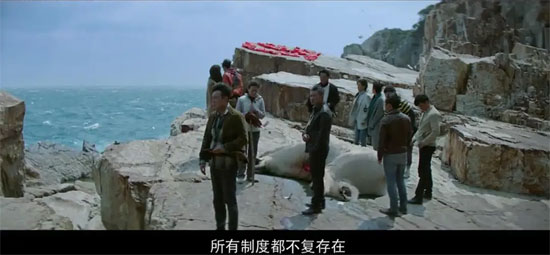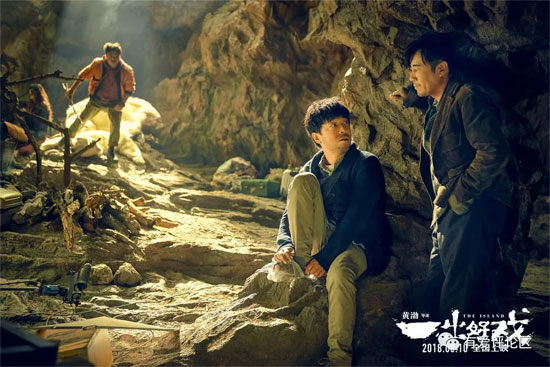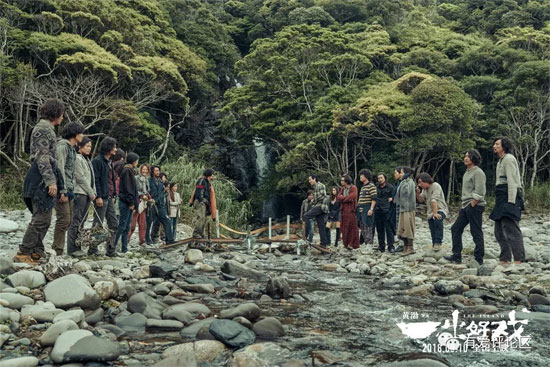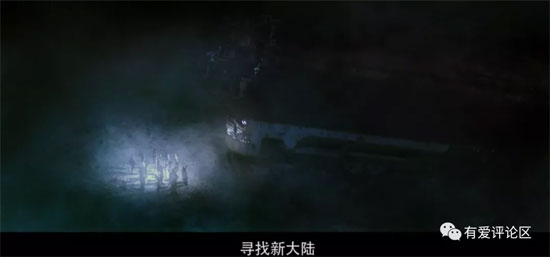Film Name:一出好戲 / The Island
Box office appeal + artistic achievement in performance—among Chinese-language film actors, Huang Bo’s combined dominance in these areas is arguably the least contested claim to the top spot… Yet as a film director, he remains a newcomer.
While actors transitioning to directing is commonplace, few achieve genuine success in this new field.
Huang Bo’s decision to make “The Island” wasn’t a spur-of-the-moment whim—watching the film only solidified this belief.

Huang Bo had this story in his heart and polished it for a long time. However, lacking practical experience, the film feels somewhat rough and stiff—like cooking a dish where you get the basics right: heating the oil, adding ingredients, stir-frying, and seasoning. But the timing isn’t quite right, and you re-season it just before serving. The taste won’t be great. Still, these flaws don’t detract from the fact that The Island
(PS: There’s a small cameo by Xu Zheng after the credits roll.)
[Friendly reminder: Spoilers ahead.]
To create an apocalyptic “end-of-the-world” and “isolated island survival” setting, the film went to great lengths, deliberately staging a meteorite collision with Earth that triggered massive waves. By sheer coincidence, this swept a group of 30 people from a company on a team-building retreat out to a small island with mountains, water, and fruit, where they managed to survive.
This is where the film’s premise becomes slightly awkward: Given the film’s content and nature, a purely fictional world would have been preferable. However, the plot heavily relies on real-world settings to advance the narrative. This results in several oddly placed plot points—like polar bear carcasses drifting near the island (suggesting drastic environmental changes) and a cruise ship that mysteriously appears on schedule, firing off fireworks (such carefree human activity hardly resembles a rescue vessel)…

Of course, all this can be understood as sacrifices made “to create an environment for testing human nature.” While some regret is inevitable, it doesn’t amount to a major setback.
“The Island” rapidly constructed its stage, swiftly stripping the survivors of their former status and identities, dismantling the social systems they had long adhered to, and forcing them to appear in a relatively pure “true form” and “primitive nature”—after all, this is the main event the film excels at and most desires to stage.
During these days of desperate survival, three leaders emerged within the island’s micro-society. Combining their respective periods of prominence creates a condensed version of human developmental history.

The first faction to gain power was the “brute labor faction.” Xiao Wang adhered to the principle of “self-reliance through hard work.” With his physical strength and survival skills, he easily secured authority and leadership during the initial crisis when scarce resources and hunger forced the group to prioritize survival.
Next to rise was the “Shrewd Planner faction.” Leveraging his long-standing authority and discontent among some toward Xiao Wang’s brutal rule, Zhang Zong successfully gathered followers. His greatest asset, however, was discovering half a boat’s worth of supplies. Using this windfall as “seed money,” he skillfully orchestrated capital operations, reclaiming his role as boss.
The protagonist Ma Jin, who “betrayed” both leaders in succession, was originally unqualified for leadership (and nearly starved to death). It was only when the heavens delivered a “fish” to fulfill the 60 million yuan promise that he gained his chance to turn the tables…

One more thing: this is where the film’s design feels less than seamless. While Xiao Wang’s faction built their power through labor-based accumulation, both Zhang and Ma Jin rode waves of luck… It’s just one of those “no coincidence without a story” moments.
With the island’s finite resources, the laborers’ efficiency proved too low while the planners showed no initiative. Conflict between the factions was inevitable. Ma Jin merely guided and amplified their existing tensions, then struck when they were exhausted—offering a more enticing vision that allowed his “Hope Faction” to seize decisive victory.
In reality, the survivors’ daily routines and way of life remained largely unchanged afterward. They still spent most of their days gathering fruit and fishing, and the playing card currency system persisted…

Ma Jin’s greatest contribution was uniting everyone. His second achievement, through Xiao Xing’s efforts, was temporarily restoring electricity for the group. As for “finding a new continent,” it seemed more like a distant, unattainable slogan—the island’s resource limitations made that clear.
If The Island had explored this aspect thoroughly, it could have been a compelling story… But the film only touches on it briefly, focusing instead on more concrete layers of human nature.
“We thought the outside world was a new beginning, a chance to start anew. But it turned out to be the same old world, and our fresh start here was just a fleeting illusion.” This devastating realization—capable of shattering the most fragile souls—tests everyone, especially Ma Jin and Xiao Xing, who went from ‘shit’ to “ice cream.”

Honestly, Xiao Xing’s descent into darkness in the latter half feels slightly abrupt. Yet upon reflection, the earlier groundwork was sufficiently laid. It’s more that Zhang Yixing’s character, as Ma Jin’s sidekick, lacked presence in the early stages (or perhaps Huang Bo’s aura was simply too overwhelming).
Still, as a mirror reflecting Ma Jin’s flaws, Xiao Xing serves his purpose well: ambition is commendable, but when greed clouds judgment and erodes moral boundaries, it becomes dangerous.
Truthfully, anyone with a modicum of sense could see that Xiao Xing’s wild schemes—whether secretly calling for help behind others’ backs, boarding the ship, or facing relentless questioning after returning to civilization—were doomed to fail and only invite disaster. Thus, Ma Jin’s final decision ultimately served everyone best.

To this end, Ma Jin even tossed into the flames that “success manual” he always carried—the one that once held a 60 million yuan lottery ticket, later served as a countdown timer, and bore Zhang Zong’s company transfer declaration. This is arguably the film’s most meticulously crafted and deeply symbolic prop.
Beyond these two main storylines, the film also weaves in Ma Jin’s romance with Shan Shan. This subplot not only enriches the themes of “social structure” and “moral choices” but also stands independently as a love story that transcends mere underdog triumph.
It must be said that Huang Bo demonstrated considerable creativity. Within this otherwise unremarkable romantic subplot, he incorporated poetic imagery like “flying with wings,” infusing the courtship with a refreshingly lighthearted touch.

What a pity. “The Island” looks impressive at first glance, but upon closer inspection, it feels lacking in depth… Perhaps a more “experienced” director could have handled several key elements with greater polish, richness, and impact.
Huang Bo’s debut film attempts so many things at once that it feels like he’s bitten off more than he can chew.
Yet this very quality is part of why I appreciate “The Island”: its evident naivety and rough edges only highlight Huang Bo’s sincerity and dedication. The film’s core concept is genuinely strong, and the creative team poured their utmost effort into executing it.
Should Huang Bo direct another film, I’ll definitely be there to support it.
Please specify:Anime Phone Cases » The Island 一出好戲 2018 Film Review: A semi-fictional allegory